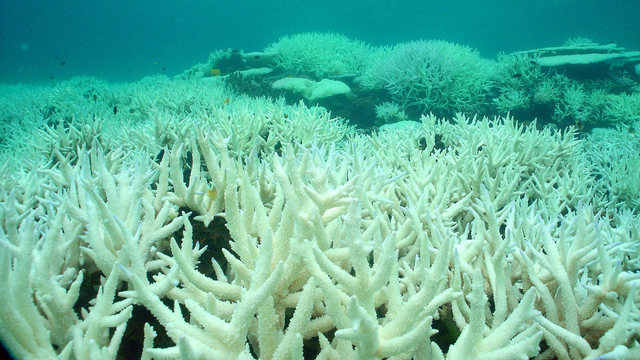Great Barrier Reef is in danger
As you may have heard already somewhere in the past couple of weeks, the Great Barrier Reef is currently in great danger. On almost all reefs coral bleaching is observed. The northern reefs are hit hardest. What is happening and what can we do?
Great Barrier Reef is in danger
Coral bleaching is a process that happens naturally and often regularly. Even on healthy reefs. It is the process in which coral polyps expel the “algae” living inside of their tissues. These algae live in symbiosis with the actual coral animals (polyps) and produce oxygen and nutrients in exchange for shelter and nutrients for themselves.
Under certain circumstances coral polyps get stressed. For example when water temperatures rise.

To “relax”, corals discard what they “think” causes their problems: their zooxanthellae. But doing that, corals not only lose an important partner in symbiosis and food source, but also all pigments that give the zoox (and with them, the coral) their colour. What remains is just the bare, white skeleton and the transparent coral polyps. This is what you will recognize as a bleached coral. Corals cannot recover from this discarding in all cases.

Currently, the weather phenomenon El Niño causes extremely high water temperatures in large parts of the Pacific Ocean. This has lead to stress in corals all over the Great Barrier Reef and also on other reefs in the region. It is estimated that at least 93% of the reefs on the GBR has been affected, but this percentage can still increase in the coming weeks. It is very likely that most of the affected reefs will recover very slowly, if they recover at all. We will probably not be around anymore if or when they fully recover. Thailand is also hit by high water temperatures at the moment. Want to read more? Check this site for example
What to do?
You can also take action to minimize the impact of such bleaching events in the future. El Niño influences and is influences by the climate on every single location on our planet. YOU also have an influece on the climate. For example, you can try to minimize your (indirect) CO2 footprint: turn off your shower one minute earlier, take your bike instead of your car and keep your tv turned off just every once in a while to play a family game instead. Every little thing you do or don’t contributes and you will notice a positive change in your own life as well. If you want to know more, you could check out The Footprint Challenge. You can estimate your Footprint on this site and also get some tips to make it smaller. Good luck!
You can also find this article on my website.
Website: coralgardening.org
Steemit: steemit.com/@coralgardening
Facebook: facebook.com/coralgardening
YouTube: youtube.com/coralgardening
Twitter: twitter.com/Coral_Gardening
Parteon: Patreon.com/frankvera
Congratulations @coralgardening! You received a personal award!
You can view your badges on your Steem Board and compare to others on the Steem Ranking
Vote for @Steemitboard as a witness to get one more award and increased upvotes!